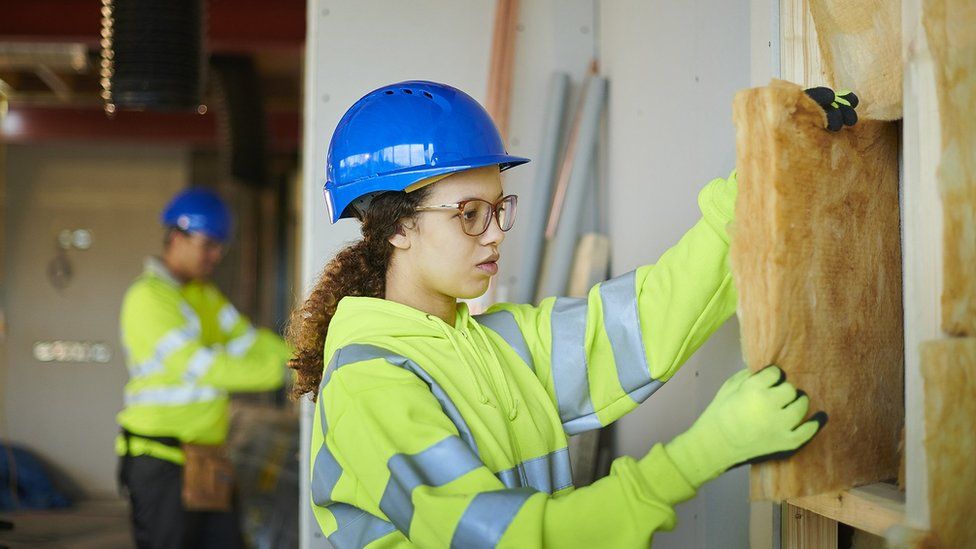Government announces extra funding to help those in least-efficient homes in lower council tax bands.
 Image source, Getty Images
Image source, Getty ImagesAn extra £1bn will be spent to insulate the UK’s least energy efficient homes, the business secretary has said.
Grant Shapps said the new funding was part of a strategy of working towards “an energy independent future” for the UK and would save those who benefitted around £310 a year.
The ECO+ scheme will target homes that have a low energy efficiency rating and are in the lower council tax bands.
A portion of the funds will be spent on the most vulnerable households.
The Department for Business, Energy, Industry and Skills (BEIS) said households who currently did not benefit from any other government support would be able to upgrade their homes under the expansion of the scheme.
A new £18m public information campaign will also offer advice on how to reduce energy use in the home, “without sacrificing comfort”, BEIS said. The advice will include turning down boiler temperatures and radiators to save energy.
Some of the government’s tips include:
- Reducing the temperature a boiler heats water to before it is sent to radiators (known as the boiler flow temperature) from 75⁰C to 60⁰C
- Turning down radiators in empty rooms
- Reducing heating loss from the property by draught-proofing windows and doors
Mr Shapps said the ECO+ scheme would “enable thousands more to insulate their homes, protecting the pounds in their pockets and creating jobs across the country”.
“We’ve spent around £6.6bn on improving millions of homes so far,” he told the BBC. “This is actually a scheme for people who have been left out thus far because their homes haven’t qualified.”
But shadow business secretary Jonathan Reynolds told the BBC the measures were “so late when we should have been doing so much more for so many years previously”.
He also accused the government of a lack of ambition when it came to plans to end the country’s dependency on fossil fuels.
The ECO+ scheme will run from spring 2023 for up to three years, and will focus on low-cost measures such as loft and cavity wall insulation and upgrades to heating. The average cost per home is expected to be £1,500.
An already existing ECO scheme is targeted at people in social housing, on low incomes or who are fuel poor.
However, under the expanded scheme, people whose homes have an energy efficiency rating of D or below can get help, whether they are in private, rented or social housing. If you are eligible, your energy firm will do a survey and pay for the improvements.
The announcement has been welcomed by fuel poverty campaigners but they also say more needs to be done to help those most in need.
Adam Scorer, chief executive of National Energy Action, said the “scheme is not designed to reach the most vulnerable, it’s designed to reach people who haven’t been able to benefit from previous schemes.
“We believe government focus should be on the worst first, helping people in the greatest risk, the greatest jeopardy, more of this money should be going to help them.”
The UK is often described as having some of the oldest and least energy efficient housing in Europe.
Two years ago, BBC research found 12 million UK homes were rated D or below on their Energy Performance Certificates, which means they don’t meet long-term energy efficiency targets.
Currently 46% of homes have an energy efficiency rating of C or above, up from 13% in 2010, according to BEIS.
In his Autumn Statement the Chancellor, Jeremy Hunt, announced a new target, to reduce energy demand by 15% by 2030.
BEIS said this target would be backed by an additional £6bn investment after 2025.
Mr Hunt said the ECO+ scheme would help “hundreds of thousands of people” better insulate their homes.
Greenpeace UK energy campaigner Georgia Whitaker said nearly seven million homes were suffering fuel poverty, while 19 million homes in England and Wales are badly insulated.
“This is a drop in the ocean compared to what people actually need to stay warm and well this winter and in the winters to come,” she said.